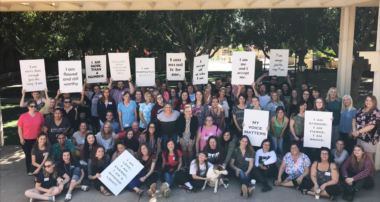As a clinical director responsible for managing and supervising staff and patients at Rosewood, I find that I bring many of the qualities I have as a mother to my work. I love being a mother and feel that this is an extremely important job. I constantly am evaluating the qualities necessary to build strong, resilient, independent, and loving children. Similarly, I want to support and help to build strength, resiliency, and hope in my staff and patients. In my book, Mom in the Mirror, I talk about Recovery and Healing for those struggling with disordered eating, poor self-esteem, and body image—about breaking the chains of self-loathing, shame, negative body image, and immobilizing anxiety. An eating disorder for many people, especially after years of living with it, often becomes an identity—a way of living in the world, avoiding fear, having control, and feeling safe. It can become difficult to know who you are without the disorder. But the eating disorder identity is a lie. Identifying and boxing oneself in with blanket terms like “anorexic” or bulimic” as who you are, instead of one aspect of you are, becomes destructive and demoralizing. It robs people of their soul and connection with others and doesn’t allow for all of the other aspects of one’s identity. It is not easy, but walking in our true, multifaceted identity requires letting go of the past, facing the fear, and embracing love. It requires acknowledging the hurt and then releasing it. Food and the body becomes the target but instead it’s a vacuum of that sucks up all the joy and peace. It is possible to work through the pain and put the past behind us. Release the shame and forgive. So first, we let ourselves feel the pain, acknowledge the bruises, and mourn them. But then, we accept. It’s not easy. It is a journey that you don’t have to do alone. But finding that connection to your soul again is the true meaning of recovery.











